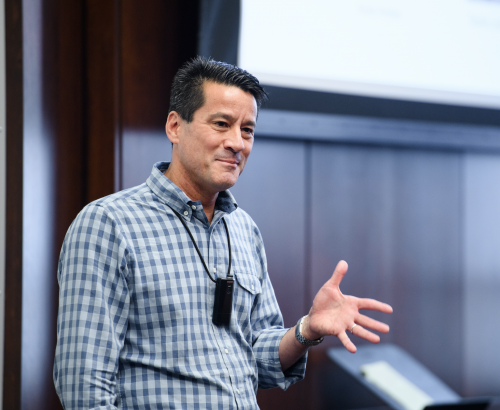Difference between revisions of "Michael Kearns"
| Line 1: | Line 1: | ||
Michael Kearns is currently a professor and the National Center Chair in the Computer and Information Science Department at the University of Pennsylvania. He is the Founding Director of the Warren Center for Network and Data Sciences. He holds secondary appointments in the departments of Economics, Statistics of Wharton as well as their departments of Operations, Information, and Decisions. He is the founder and former director of Penn Engineering's Networked and Social Systems Engineering Program. Another former role of his being the co-director of Penn's interdisciplinary Institute for Research in Cognitive Science. | Michael Kearns is currently a professor and the National Center Chair in the Computer and Information Science Department at the University of Pennsylvania. He is the Founding Director of the Warren Center for Network and Data Sciences. He holds secondary appointments in the departments of Economics, Statistics of Wharton as well as their departments of Operations, Information, and Decisions. He is the founder and former director of Penn Engineering's Networked and Social Systems Engineering Program. Another former role of his being the co-director of Penn's interdisciplinary Institute for Research in Cognitive Science. | ||
| + | |||
| + | [[File:Michael_Kearns.png|500px|thumb|right|Screenshot of google showing accounts I follow on instagram]] | ||
He also has prior work in the private sector, having worked with Bank of America, Lehman Brothers, SAC Capital, and Morgan Stanley in roles associated with quantitative & algorithmic trading. He has experience working as an advisor to technology companies and venture capital firms. Kearns began a role with Amazon as part of their Scholars Program, focusing on algorithmic fairness, privacy, machine learning, and related topics within Amazon Web Services in June 2020. | He also has prior work in the private sector, having worked with Bank of America, Lehman Brothers, SAC Capital, and Morgan Stanley in roles associated with quantitative & algorithmic trading. He has experience working as an advisor to technology companies and venture capital firms. Kearns began a role with Amazon as part of their Scholars Program, focusing on algorithmic fairness, privacy, machine learning, and related topics within Amazon Web Services in June 2020. | ||
Revision as of 16:47, 12 March 2021
Michael Kearns is currently a professor and the National Center Chair in the Computer and Information Science Department at the University of Pennsylvania. He is the Founding Director of the Warren Center for Network and Data Sciences. He holds secondary appointments in the departments of Economics, Statistics of Wharton as well as their departments of Operations, Information, and Decisions. He is the founder and former director of Penn Engineering's Networked and Social Systems Engineering Program. Another former role of his being the co-director of Penn's interdisciplinary Institute for Research in Cognitive Science.
He also has prior work in the private sector, having worked with Bank of America, Lehman Brothers, SAC Capital, and Morgan Stanley in roles associated with quantitative & algorithmic trading. He has experience working as an advisor to technology companies and venture capital firms. Kearns began a role with Amazon as part of their Scholars Program, focusing on algorithmic fairness, privacy, machine learning, and related topics within Amazon Web Services in June 2020.
Kearns is an elected Fellow of the American Academy of Arts and Sciences, the Association for Computing Machinery, the Association for the Advancement of Artificial Intelligence, and the Society for the Advancement of Economic Theory.
Educational Background
Kearns's education began by being born into a highly academic family. His father David R. Kearns is Professor Emeritus at the University of California, San Diego in Chemistry (winner of the Guggenheim Fellowship in 1969), his uncle Thomas R. Kearns also a Professor Emeritus at Amherst College in Philosophy, his paternal grandfather Clyde W. Kearns was a well-known professor at the University of Illinois where is his specialty was insecticide toxicology, and his maternal grandfather Chen Shou-Yi was a professor of history and literature at Pomona College.
Michael Kearns completed his B.S. degree in math and computer science at the University of California at Berkeley graduating in 1985. In 1989, he completed a Ph.D. in computer science at Harvard University. His dissertation, "The Computational Complexity of Machine Learning" was published thereafter. Before joining AT&T Bell Labs in 1991, he continued with postdoctoral positions at the Laboratory for Computer Science at MIT and at the International Computer Science Institute (ICSI) in UC Berkeley.
Research
Kearns's research background is broad, he describes it in his University of Pennsylvania bio:
My research interests include topics in machine learning, algorithmic game theory and microeconomics, computational social science, and quantitative finance and algorithmic trading. I often examine problems in these areas using methods and models from theoretical computer science and related disciplines. While much of my work is mathematical in nature, I also often participate in empirical and experimental projects, including applications of machine learning to problems in algorithmic trading and quantitative finance, and human-subject experiments on strategic and economic interaction in social networks.
He has published over 140 research papers dating back to 1987
Books
The Ethical Algorithm: The Science of Socially Aware Algorithm Design. The Ethical Algorithm is jointly authored with Aaron Roth, and is a general-audience book about the science of designing algorithms that embed social values like privacy and fairness.
An Introduction to Computational Learning Theory Jointly authored with Umesh Vazirani of U.C. Berkeley, this MIT Press publication is intended to be an intuitive but precise treatment of some interesting and fundamental topics in computational learning theory. The level is appropriate for graduate students and researchers in machine learning, artificial intelligence, neural networks, and theoretical computer science.
